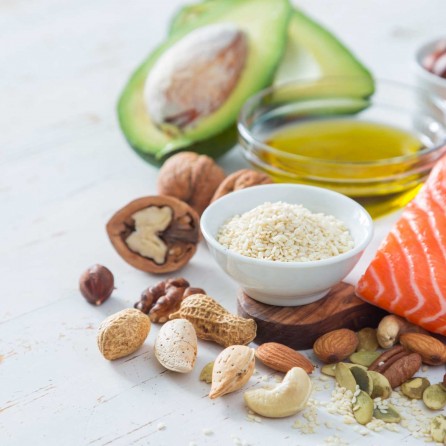Watch this short video to hear from Professor Jelinek about the importance of reducing saturated fat consumption.

There are many different types of fats. Some are ‘good’ for the immune system, others are neutral and some are ‘bad’. We need a balance of omega-3s and 6s, but many of us have too much omega-6 in our diet, which promotes inflammation. Here’s a useful list to help you figure out which is which.
A key part of the Overcoming MS diet suggestions is understanding what fats and oils are, their properties, and how the different types of fats, both naturally occurring and human-made fats, play a role in MS development and progression.
Watch this short video to hear from Professor Jelinek about the importance of reducing saturated fat consumption.
Sources: Flax seeds, hemp seeds, chia seeds, some leafy green vegetables, walnuts, fish and fish oil.
Need to know…
Avoid cooking with omega 3 fats, instead add these oils to a dish after it’s cooked.
Sources: Sunflower seeds, sesame seeds, corn, soybeans, wheatgerm and their respective oils, as well as overconsumption of grains and some legumes e.g. chickpeas.
Need to know…
Polyunsaturated fats have the lowest melting points and are liquid at room temperature and in the fridge. Many are what we call essential fatty acids – they’re vital for normal bodily functions but cannot be manufactured in the body.
Sources: Olives, avocados, macadamia nuts, hazelnuts, pecans, and their respective oils, as well as unrefined rapeseed oil, sunflower and safflower (rapeseed) oils.
Considered neutral for the immune system
Need to know…
Sources: Animal fats, dairy, and all tropical fats (palm and coconut).
Need to know…
Avocados and many nuts are high in saturated fats and should be consumed in moderation
Sources: Hydrogenated or partially-hydrogenated vegetable oils (margarine) and refined ‘cooking oils’, such as canola or corn oils.